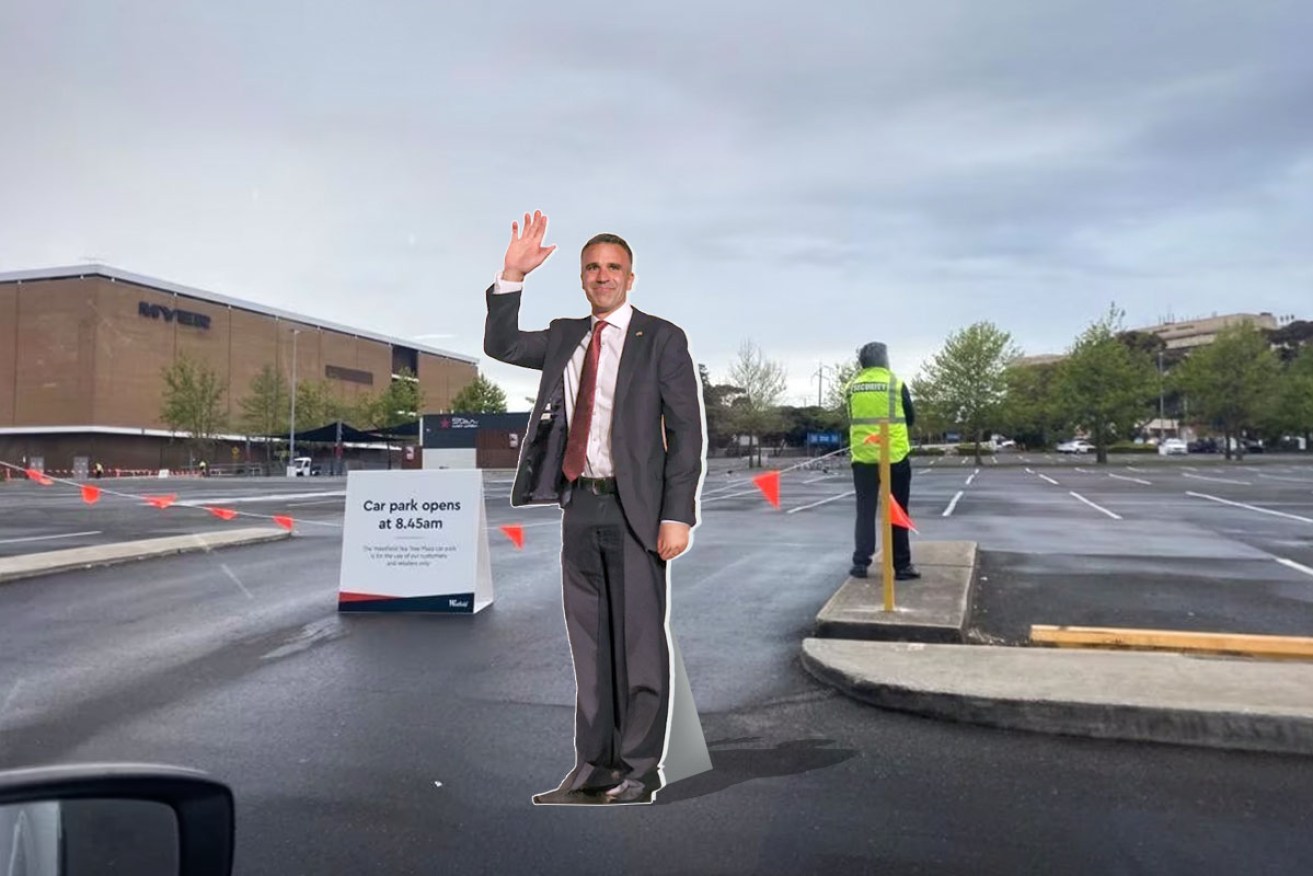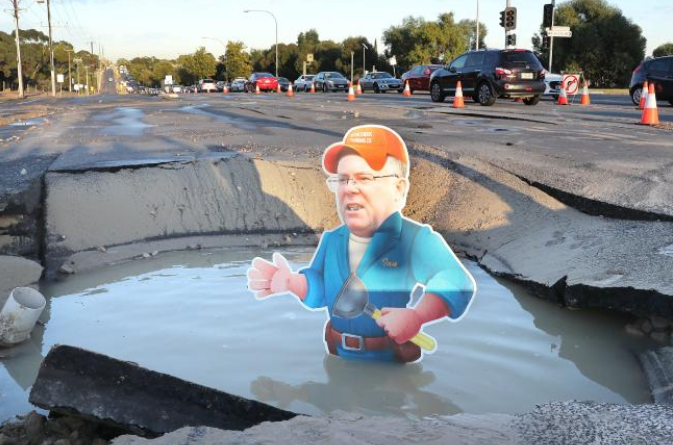Populist policy-making leads to a free-for-some
Political populism has led to some absurd results, with a recent Adelaide opening a classic of the genre.


Digital image by James Taylor/InDaily. Car park image supplied
The last time News Corp’s daily print newspaper dragged a cardboard cut-out around Adelaide, it was a world away from its recent attempt to cash in on Taylor Swift’s enormous fan base.
Rather than taking a cartoon Taylor on a tour of the city’s sights, back in 2016 the cut-out campaign was targeted at a slightly less popular figure – Ian Hunter, the Weatherill Government’s water minister.
Like Taylor, he sometimes inspired tears.
The city, back in those gentle pre-COVID times, was looking for something to be outraged about, and it took the rather prosaic form of burst water mains.
The slightest dribble was on the evening news, discussed on talkback and all over the paper. Some of the burst water mains, as they do today, caused significant damage, including one gusher at Paradise that flooded homes, with the deluge caused by “operator error”.
Hunter apologised, but that wasn’t enough for the newspaper which decided he should personally attend such events to inspect the damage and comfort the afflicted.
It seemed particularly unusual to demand Hunter do this. Did the paper want already troubled people to be even sadder?
Hunter could have an intemperate approach to politics.
The pugilistic pollie attracted national headlines when he used some naughty words at a dinner with interstate and federal water ministers at the long-gone Rigoni’s Bistro in Leigh Street. The topic was the Murray Darling Basin Plan and it seemed appropriate for the South Australian minister to be grumpy about the manoeuvrings of the up-stream states.
Hunter was spotted after dinner eating an ice-cream on the street which, for reasons that remain inexplicable, was presented as some sort of affront.
One of the objects of his “strong language” – he denied dropping the C-bomb – was then federal water minister Barnaby Joyce, filmed recently in the Canberra suburb of Braddon, lying on the ground, speaking on his phone and dropping the C-bomb. There was no ice-cream involved.
Anyway, after months of the cardboard cutout doing the rounds of burst water mains, the annual independent report came out on the performance of water utilities across the nation.

The Tiser’s Ian Hunter cut-out.
It showed that SA Water was an above-average performer on burst water mains in 2015-16.
It also showed SA Water was an underperformer in some areas, including the time taken to restore an interrupted supply and the frequency of sewerage pipe breaks and chokes.
Unfortunately for everyone who likes government investment to focus on real problems rather than imagined ones, the populist campaign against Ian Hunter made our politicians jump.
The Minister announced an accelerated program to fix performance where we were doing quite well, rather than where we were behind the pack.
I guess dragging a cardboard cut-out to the site of blocked sewerage pipes wouldn’t have had quite the same appeal.
Populism in politics can not only lead to investment in stuff that isn’t particularly needed, but it can also lead to some outright absurd policy-making.
The current state government loves itself some populism, particularly in marginal seats.
Last Friday, it proudly announced the opening of a $43.5 million government car park – that drivers have to pay to use – within metres of a private car park, where the owners can’t charge because the government introduced legislation to stop it doing so.
The Liberals described the move as “sky-high hypocrisy”, which seems fair enough. The project was subject to numerous announcements by the Marshall Liberal Government which needed to hang on to the local seat of Newland (it didn’t help – they lost).
The car park in question is an official government “park-and-ride” site, adding 500 new spaces next to an existing 700-space park-and-ride at Tea Tree Plaza.
It’s designed to encourage commuters to drive their cars to the O-Bahn interchange before hopping on a bus, with some locals complaining about a lack of parking at the transport hub.
Most government park-and-rides are free to use, but not this one, which attracts a small charge for Metrocard users.
It is awkwardly located next to Westfield’s giant Tea Tree Plaza with its more than 4000 car parks – the place that inspired the Labor Government’s legislation to ban operators of large shopping centres from charging for car parking.
The legislation only came into force a few weeks ago.
While the ink was still drying on the government’s triumphant press release, it sent out another one celebrating the opening of its paid car park next door.
The forced free parking at the car park not owned by the government was part of Peter Malinauskas’s election strategy.
He needed the votes of retail workers and shoppers at the Plaza, which is a hub for a nest of crucial local seats. It didn’t hurt that the union he previously ran, the Shoppies, was campaigning against Westfield’s moves to charge people to use the car park it pays for, owns and maintains, in the interests of keeping costs down for retail workers.
There is no universal principle here: if you’re a retail worker in the city there are no freebies for you. If you use the O-Bahn, the government expects you to drive to the park and ride, pay your fee, jump on a bus, and pay your fee (you could skip the parking bit if the government funded enough feeder buses to Tea Tree Plaza, but that’s another debate).
The double standards applied to Tea Tree Plaza’s side-by-side motor vehicle repositories are classic Adelaide, where car parks attract the kind of reverence the Renaissance Florentines reserved for its cathedrals.
Funnily enough, state Labor once understood that price signals aren’t always such a bad thing when it comes to car parking.
Some members of Peter Malinauskas’s current cabinet were intimately involved with the previous Weatherill administration’s attempts to jack up car park pricing in the city.
Unlike the Tea Tree Plaza workers who, despite being better served with public transport than most of the metropolitan area, apparently deserve free parking forever, Labor once wanted to make car parks much more expensive for CBD workers.
Its car park tax, ironically in this case, was designed to bring in cash to pay for – drum roll – more park-and-rides on the O-Bahn route.
The $750 per year levy on CBD car parking spaces was designed to rake in millions of dollars, not only to fund public transport projects but to send a price signal and reduce city congestion – a commendable attempt, one might say, to shift Adelaide’s myopic focus on driving over mass transit.
Parliament voted it down.
Then Treasurer Tom Koutsantonis – who’s back in charge of Transport – had to rejig his budget and cancelled some park-and-ride projects.
Who knows how the Tea Tree Plaza policy mishmash will turn out? Populism dictates that it doesn’t matter.
The local seats are in Labor hands, the TTP workers are happy, and the losers – notably the often vulnerable people who rely solely on public transport, for whom the $43.5 million car park and the “free parking” legislation are useless trifles – are left to ponder the pointy end of powerlessness.
Notes on Adelaide is a weekly column reflecting on the city, its strengths and its foibles. You can read more Notes on Adelaide in SALIFE’s print editions.




